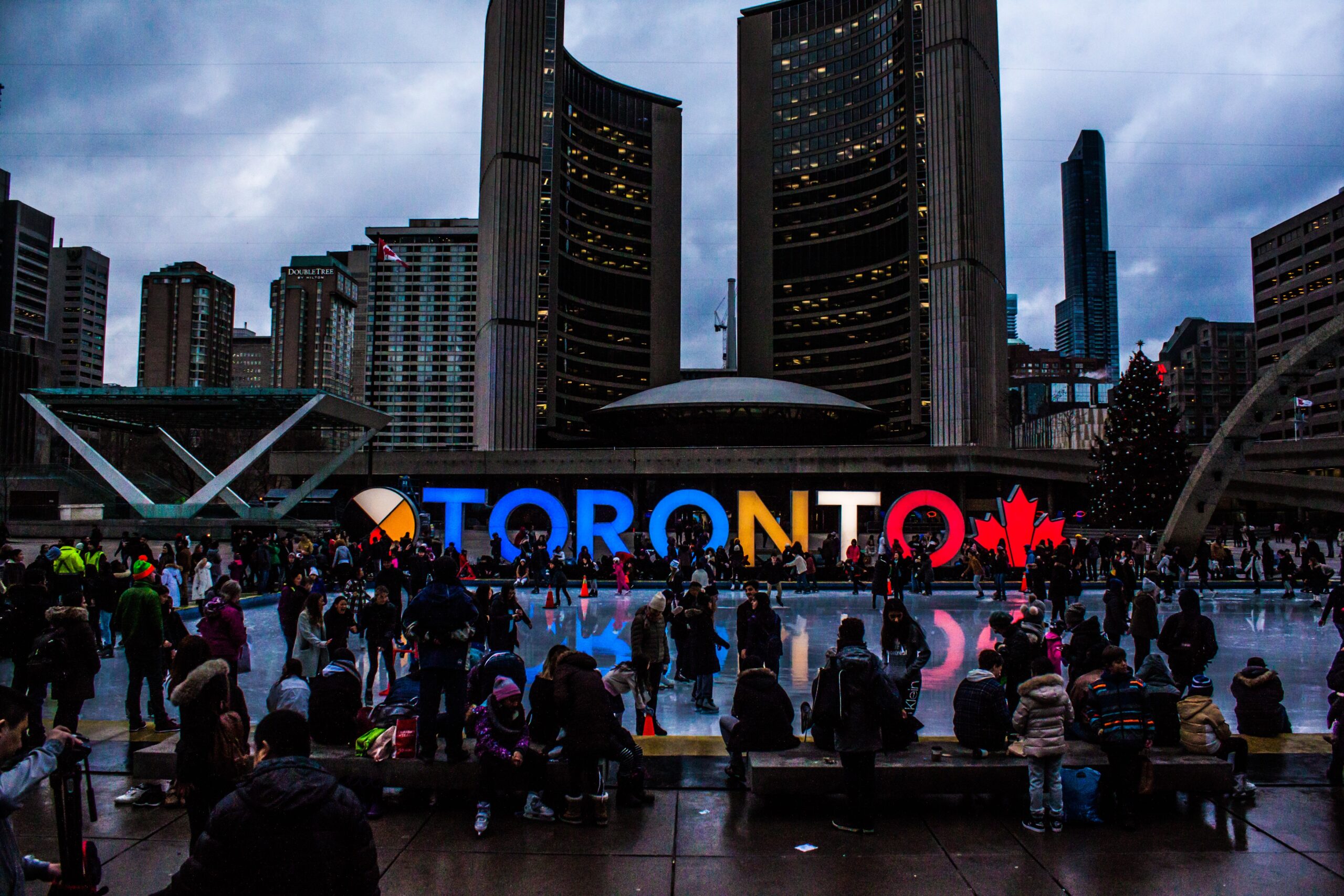If your heart’s compass has led you to the enchanting lands of Canada, guided by the hand of love, you’re in for a remarkable and life-changing chapter.
Imagine the thrill of embarking on a journey with your beloved, hand in hand, as you navigate the path to a new life in the Great White North. With its stunning landscapes, multicultural cities, and thriving communities, Canada beckons with open arms. The avenue to this dreamland, often paved with shared dreams and aspirations, is through marriage.
In this comprehensive guide, we will take you on a heartwarming journey that explains, step by step, how to relocate to Canada through marriage. You’ll discover the joys, the challenges, and the exhilarating process of turning love into a lifelong adventure in a land filled with opportunities.
So, it doesn’t matter if you’re newly engaged or you’ve been married for decades; join us as we unravel the secrets of love’s most remarkable journey.
This is your love story, written in the pages of Canada’s storybook. Welcome to the tale of “How to Relocate to Canada through Marriage.”
Requirements for How to Relocate to Canada through Marriage

Before embarking on the journey of relocating to Canada through marriage, it’s crucial to understand the eligibility criteria and requirements for the Canadian citizen or permanent resident spouse (the sponsor) and the foreign spouse (the sponsored person). Meeting these criteria is essential for a successful sponsorship application.
For the Sponsor (Canadian Citizen or Permanent Resident)
Age: To sponsor a spouse, you must be at least 18 years old.
Legal Status: You must be a Canadian citizen or a permanent resident of Canada.
Financial Responsibility: Sponsors are required to demonstrate their ability to provide for the basic needs of the sponsored spouse, including food, shelter, and clothing. This typically involves meeting specific income thresholds, which can vary depending on the size of the family. If you do not meet the income requirements, you may need a co-signer who can provide financial support.
No Outstanding Sponsorship Undertaking: You cannot sponsor another spouse until you have met the terms and conditions of any previous sponsorship agreements, including repaying any social assistance received by the sponsored spouse.
No Criminal Record: You must not have a criminal record or pose a risk to the safety and security of your spouse or Canadian society.
For the Sponsored Spouse (Foreign National)
Legal Marriage: The marriage between the Canadian sponsor and the foreign spouse must be legally recognized in the country where it took place and in Canada.
Medical and Criminal Checks: Sponsored spouses must undergo medical examinations and criminal background checks to ensure they do not pose a risk to Canadian public health or security. Certain medical conditions or criminal convictions may result in inadmissibility.
Genuine Relationship: One of the most critical factors in the sponsorship process is demonstrating the authenticity of the relationship. You must provide evidence to prove that your marriage is not solely for immigration purposes. This can include joint financial documents, photographs, communication records, and affidavits from friends and family attesting to the legitimacy of your relationship.
Meeting these eligibility requirements is the first step in the process of relocating to Canada through marriage. It’s essential to thoroughly understand and fulfill these criteria to increase your chances of a successful sponsorship application. Additionally, consulting with an immigration lawyer or expert can provide valuable guidance in navigating this process.
Marriage Process for Relocating to Canada
Getting married in Canada is a significant milestone on the path to relocating to the country through marriage. A legally recognized marriage is a fundamental requirement for the sponsorship process, and the steps to get married in Canada can vary depending on the province or territory where you plan to tie the knot. Here’s an overview of the typical marriage process:
Research and Choose a Province/Territory
Canada has ten provinces and three territories, each with its own marriage laws and requirements. Research and select the province or territory where you wish to get married.
Obtain a Marriage License
Before you can legally marry in Canada, you need to obtain a marriage license. This document is typically issued by the vital statistics office or a similar authority in the province or territory of your choice. The requirements for obtaining a marriage license can vary but usually include presenting identification, providing proof of age, and, in some cases, showing proof of divorce or the death of a previous spouse, if applicable.
Choose a Wedding Venue
Once you have your marriage license, you can plan your wedding ceremony. Choose a venue that suits your preferences, whether a city hall, a place of worship, or a scenic outdoor location.
Conduct the Wedding Ceremony
Depending on your preferences, a religious leader or civil marriage commissioner can officiate your wedding ceremony. You and your spouse will exchange vows and rings during the ceremony and sign the marriage register.
Obtain the Marriage Certificate
After your wedding, it’s important to obtain a marriage certificate. This document serves as official proof of your marriage and is essential for the immigration process. The marriage certificate can be obtained from the vital statistics office in the province or territory where you were married.
Legalize the Marriage for Immigration Purposes
In some cases, you may need to have your marriage certificate translated and legalized for immigration purposes, depending on the regulations of your home country and the requirements of the Canadian immigration authorities. This often involves a process called “Apostille” or document authentication.
Notify Canadian Immigration Authorities
Suppose you were already in Canada on a temporary visa, such as a visitor visa, when you got married. In that case, you may need to inform Canadian immigration authorities of the change in your status. This is important for your subsequent sponsorship application.
Once you’ve completed the marriage process, you can move forward with the sponsorship application, which is the next crucial step in your journey to Canada through marriage.
Sponsorship Process
The sponsorship process is at the heart of relocating to Canada through marriage. In this step, the Canadian citizen or permanent resident spouse (the sponsor) is responsible for sponsoring their foreign spouse (the sponsored person) for Canadian permanent residency. The process involves various requirements and steps that must be carefully followed to ensure a successful application.
Eligibility and Relationship Assessment
Before proceeding with the sponsorship, it’s crucial to establish the authenticity of the marriage and the eligibility of both the sponsor and the sponsored person. This includes ensuring that the marriage is legally recognized and that there is sufficient evidence of a genuine relationship.
Completing the Sponsorship Application
The sponsor must complete the appropriate sponsorship application package. This includes forms for both the sponsor and the sponsored person. The forms may vary depending on the location and current immigration policies. Ensure that you use the most up-to-date application forms, which can be obtained from the official website of Immigration, Refugees, and Citizenship Canada (IRCC).
Gathering Required Documents
Both the sponsor and the sponsored person will need to provide various documents as part of the application. These documents may include marriage certificates, birth certificates, passports, police clearance certificates, and medical examinations.
Financial Requirement
Sponsors must demonstrate their ability to financially support the sponsored person. The financial requirement is assessed based on the size of the family unit and is subject to change over time. A co-signer with the required income may be necessary if the sponsor does not meet the income threshold.
Application Submission
Once the application is complete and all required documents are gathered, it should be submitted to IRCC. Applications are typically submitted online, and it’s essential to pay the associated processing fees.
Medical and Criminal Checks
Both the sponsor and the sponsored person will be required to undergo medical examinations and criminal background checks. These checks aim to ensure that they do not pose a risk to Canadian public health or security.
Interview and Assessment
In some cases, IRCC may request an interview with the sponsor and sponsored person to assess the authenticity of the relationship. It’s important to be well-prepared for this interview, providing accurate and consistent information.
Waiting Period
After the application is submitted, there is a waiting period during which IRCC reviews the application. The processing time can vary, and monitoring the application status online is important.
Decision and Arrival
The sponsored person will receive a Confirmation of Permanent Residence (COPR) and a Permanent Resident Visa (PRV). These documents allow them to enter Canada as a permanent resident. Once in Canada, they can enjoy the privileges and benefits of permanent residency.
Settlement and Integration
Successfully relocating to Canada is only the beginning. The sponsored person and their spouse must now focus on settling into Canadian society. This involves finding housing and employment and connecting with their new community.
Translations and Notarization
If any of your documents are not in English or French, they must be translated into one of these languages. Some documents may also require notarization for authenticity.
Check for Updates and Changes
Ensure you regularly check the IRCC website for any updates or changes to the required documents and application process. Immigration policies can change, so having the most current information is essential.
Application Submission
Once you have gathered all the required documents and completed the sponsorship application, the next crucial step in relocating to Canada through marriage is to submit your application to Immigration, Refugees, and Citizenship Canada (IRCC). Here’s a breakdown of what you need to know about the application submission process:
Online Application
In most cases, sponsorship applications are submitted online through the IRCC’s secure website. You will need to create an online account to access the application forms.
Paper Application (in exceptional cases)
While online applications are the preferred and faster method, paper applications may still be accepted in certain situations. Check the IRCC website for specific details if you believe your case qualifies for this option.
Application Package
The application package typically includes the following components:
-
- Completed sponsorship application forms for the sponsor and sponsored person.
- The required supporting documents should be organized and labeled for easy reference.
- A processing fee receipt.
- Any additional documents or forms that are specific to your case.
Processing Fees
A processing fee is required for the sponsorship application, and it is non-refundable, even if the application is not approved. The fee can vary depending on the sponsorship category and associated services, such as medical exams.
Fee Payment
Payment of the processing fee is made online using a credit card or a certified bank draft if submitting a paper application. Be sure to keep a record of your payment receipt for your records.
Submission Timing
Carefully consider when to submit your application. Be aware of any changes in processing times or immigration policies. Note that processing times can vary, and keeping an eye on the latest updates and average wait times is essential.
Checklist and Double-Check
Before hitting the submit button, carefully review your entire application to ensure that you have included all necessary documents and information. Missing or incomplete information can lead to delays or application rejection.
Waiting for Acknowledgment
After applying, you will receive an acknowledgment from IRCC confirming receipt. This acknowledgment may include a unique application number that allows you to track the progress of your application online.
Ongoing Communication
During the processing of your application, IRCC may contact you for additional information or request an interview. It’s important to respond promptly and provide accurate details.
The application submission is a significant milestone in your journey to relocate to Canada through marriage. It marks the beginning of the official assessment process. Throughout this period, maintaining open lines of communication with IRCC and being prepared to address any requests for additional information will help ensure a smoother and more efficient process. While waiting for a decision, you can use this time to prepare for your potential move to Canada and understand the next steps once your application is approved.
Medical and Criminal Checks
As part of relocating to Canada through marriage, the Canadian citizen or permanent resident spouse (the sponsor) and the foreign spouse (the sponsored person) are required to undergo medical and criminal checks. These checks are essential for assessing admissibility to Canada. Here’s what you need to know:
Medical Examination
- Authorized Panel Physicians: The medical examination must be conducted by a physician approved by Immigration, Refugees, and Citizenship Canada (IRCC). IRCC designates specific physicians, known as “panel physicians,” to perform these exams in various countries. You can find a list of panel physicians on the IRCC website.
- Costs: The costs of the medical examination are typically the responsibility of the sponsored person. The fees may vary depending on the physician and the specific medical tests required.
- Required Tests: The medical examination usually includes a physical examination, blood tests, and chest X-rays. These tests aim to determine if the sponsored person has any conditions that might pose a public health risk in Canada.
- Results Submission: The panel physician will provide the medical examination results directly to IRCC, usually electronically. It’s essential for the sponsored person to bring a copy of the Medical Report (IMM 1017) and the applicable test results to the interview or medical exam.
Criminal Background Checks
- Police Clearance Certificate: Both the sponsor and the sponsored person are required to obtain a police clearance certificate from each country where they have lived for six months or longer since the age of 18. This certificate confirms whether the individual has a criminal record in those countries.
- Types of Checks: Police clearance certificates can come in different forms, such as a criminal record check, a police certificate, or a police clearance certificate, depending on the country. These documents must be issued within the last six months.
- Submission of Certificates: The police clearance certificates should be included in the sponsorship application. Ensure that you submit a copy of each certificate, even if it indicates no criminal record. In some cases, the certificates may be required to be sent directly from the issuing authorities to IRCC.
- Validity Period: It’s important to note that police clearance certificates have an expiration date. Be sure to check the expiry date of each certificate to ensure they are still valid when submitting your application.
Interview and Assessment
The interview and assessment phase is critical to the sponsorship process when relocating to Canada through marriage. It serves as a means for Immigration, Refugees, and Citizenship Canada (IRCC) to evaluate the authenticity of the marital relationship between the Canadian citizen or permanent resident spouse (the sponsor) and the foreign spouse (the sponsored person). Here’s what to expect during this phase:
Selection for an Interview
- Random Selection: Not all sponsorship applications are chosen for an interview. IRCC randomly selects some applications for further assessment. Therefore, even if you are well-prepared, an interview may or may not be part of your application process.
- Notification: If your application is selected for an interview, you will receive a notice from IRCC detailing the interview date, location, and instructions on how to prepare.
Purpose of the Interview
- Authenticity Verification: The primary purpose of the interview is to assess the genuineness of the relationship between the sponsor and the sponsored person. The immigration officer conducting the interview will look for consistent and convincing evidence that the marriage is not solely for immigration purposes.
- Eligibility Confirmation: The interview may also serve to confirm that both the sponsor and the sponsored person meet all eligibility criteria and have provided accurate information in their application.
Preparing for the Interview
- Documentation: Review all the documents submitted with your application before the interview. Be prepared to provide any additional or clarifying documents requested by IRCC.
- Practice: The sponsor and the sponsored person should practice answering questions related to their relationship. Be prepared to discuss how you met, shared experiences, future plans, and other aspects of your relationship.
- Honesty: During the interview, be honest and consistent in your responses. Misrepresenting information can lead to serious consequences, including the rejection of the application.
During the Interview
- Questions: Expect questions about your relationship history, such as how you met when you got married, shared experiences, and any future plans you have together.
- Individual Interviews: In some cases, the sponsor and the sponsored person may be interviewed separately to ensure consistency in their answers.
- Evidence Review: The immigration officer may ask for evidence of your relationship, such as photographs, joint financial records, letters from friends and family, and communication records.
Post-Interview Assessment
- Decision Timeframe: After the interview, the immigration officer will assess the information provided and decide whether to approve the sponsorship application. The processing time following the interview can vary.
- Possible Additional Information: If the officer requires more information or has concerns about the authenticity of the relationship, they may request additional evidence or documentation.
Waiting Period
The waiting period is a phase of uncertainty during the sponsorship process when relocating to Canada through marriage. It’s the time between submitting your sponsorship application and receiving a decision from Immigration, Refugees, and Citizenship Canada (IRCC). Here’s what you should know about this period:
Varied Processing Times
- Processing Times: The length of the waiting period can vary significantly. Processing times for sponsorship applications can depend on various factors, including the category of sponsorship, the number of applications in the queue, and changes in immigration policies. It’s crucial to check the IRCC website for current average processing times.
- Incomplete Applications: Incomplete or inaccurately filled applications may lead to delays. Ensure your application is thorough and you’ve provided all required documentation to minimize potential setbacks.
Monitoring Your Application
- Online Status: You can monitor the status of your application by logging into your IRCC account or using the unique application number provided in the acknowledgment of receipt.
- Updates and Requests: IRCC may request additional information or documents during the waiting period. It’s essential to respond promptly and accurately to any such requests.
Communication During the Waiting Period
- Be Responsive: Be attentive to communication from IRCC. Ensure that your contact information is up-to-date, as you may receive notifications by email, regular mail, or through your online account.
- Professional Advice: If the waiting period becomes extended or if you encounter any issues, consider seeking advice from an immigration expert or lawyer. They can provide guidance and address concerns that may arise.
Importance of Patience
- Stay Patient: Waiting can be a trying experience, but maintaining patience is crucial. Immigration processes often involve significant paperwork and administrative steps, which can lead to varying waiting times.
- Use the Time Wisely: While waiting for a decision, consider preparing for your potential move to Canada. Research the province or territory you intend to reside in, explore job opportunities, and look into community support services.
Plan for the Next Steps
- Post-Approval Planning: In anticipation of a successful sponsorship application, begin planning for the next steps, such as travel arrangements, housing, and settling into Canadian society.
- Know What Comes Next: Familiarize yourself with the confirmation of permanent residence (COPR) and permanent resident visa (PRV) issuance process, as these are the documents that allow the sponsored person to enter Canada as a permanent resident.
Decision and Arrival
The moment of decision is the culmination of your efforts to relocate to Canada through marriage. Once Immigration, Refugees, and Citizenship Canada (IRCC) has reviewed your sponsorship application, you’ll receive a verdict on whether your application has been approved. Here’s what to expect and what comes next:
Application Decision
- Approval: If your sponsorship application is approved, you will receive a formal notice from IRCC indicating that your spouse has been granted permanent residency in Canada. This document is often referred to as the Confirmation of Permanent Residence (COPR).
- Rejection: If your application is rejected, IRCC will provide reasons for the decision. Depending on the circumstances, you may have the option to appeal the decision or reapply.
Permanent Resident Visa (PRV)
- Issuance of PRV: Along with the COPR, a Permanent Resident Visa (PRV) will be issued to your spouse. The PRV allows your spouse to travel to Canada as a permanent resident. It is typically issued as a counterfoil in the foreign passport.
Arrival Planning
- Preparing for Arrival: Once the COPR and PRV are in hand, it’s time to plan for your arrival in Canada. This includes organizing travel, packing your belongings, and making any necessary arrangements for your new life.
- Travel to Canada: Your spouse should travel to Canada before the PRV expires. Arriving after this date may require a new PRV to be issued.
Port of Entry
- Informative Guide: Before arriving in Canada, reviewing the “First Steps to Canada” guide provided by IRCC is helpful. This guide offers detailed information on what to do when you first arrive, including the requirements for entry.
- Documentation: Ensure that your spouse has the necessary documents at the port of entry. These documents include the COPR, PRV, passport, and any other required travel documents.
- Landing Process: At the port of entry, your spouse will undergo a landing process to officially become a permanent resident. This includes meeting with a Canada Border Services Agency (CBSA) officer who will confirm their status.
Settling into Canadian Life
- Housing and Employment: After the arrival, you’ll need to find suitable housing and, if necessary, employment. Start exploring your options for housing, and if you’re planning to work in Canada, consider job opportunities that align with your skills and qualifications.
- Settlement Services: Canada offers a range of settlement services to assist newcomers in adjusting to their new life. These services may include language classes, job search support, and community integration programs.
- Healthcare: Ensure that you and your family members are aware of the healthcare system in Canada, as you may need to enroll in provincial healthcare plans, such as the Ontario Health Insurance Plan (OHIP) or British Columbia’s Medical Services Plan (MSP), depending on your province of residence.
The decision and arrival phase marks the transition from being a sponsored spouse to becoming a permanent resident in Canada. It’s a momentous step in your journey as you take the first steps toward building a life in this diverse and welcoming nation. Proper planning and preparation during this phase will contribute to a smooth and successful transition to your new home.
Settlement and Integration
The journey to relocate to Canada through marriage doesn’t conclude upon receiving permanent residency. Settlement and integration into Canadian society are ongoing processes that require adaptation and acclimatization. Here are some key points to consider during this phase:
1. Embrace Cultural Diversity:
Canada is celebrated for its multicultural society, where people from all corners of the world coexist harmoniously. Embrace this diversity by participating in local cultural events, festivals, and community activities. This openness will enrich your experience and help you connect with people from various backgrounds.
2. Language Proficiency:
While English and French are Canada’s official languages, communicating effectively in either language can significantly enhance your experience. If English or French is not your first language, consider enrolling in language classes available through settlement agencies or community centers.
3. Settlement Services:
Canada offers numerous settlement services to assist newcomers in adjusting to life in the country. These services may include:
- Language classes and language assessments.
- Employment support, including job search assistance, resume building, and interview coaching.
- Housing assistance and information about available government-sponsored housing programs.
- Access to healthcare services, including enrollment in provincial healthcare plans.
- Information on Canadian laws and regulations.
- Integration programs, such as community orientation and cultural diversity courses.
4. Employment and Education:
Finding employment or pursuing further education in Canada is often a top priority. Research job opportunities and consider getting your foreign credentials assessed and recognized in Canada, if necessary. Additionally, explore educational opportunities to upgrade your skills or pursue higher education.
5. Networking:
Building a social and professional network is crucial for integration. Attend local events, join clubs or associations related to your interests, and engage in community activities. Networking can lead to meaningful connections, job opportunities, and a sense of belonging.
6. Housing and Finances:
Ensure that you have a safe and suitable place to live. Explore your options for housing, whether it’s renting an apartment, buying a home, or staying with family. Create a budget to manage your finances effectively and consider opening a Canadian bank account.
7. Healthcare:
Familiarize yourself with the Canadian healthcare system. Depending on your province of residence, you may need to enroll in the provincial healthcare plan. Know how to access medical services and understand your healthcare rights and responsibilities.
8. Volunteer and Civic Engagement:
Volunteering in your local community is a great way to integrate and give back. Engaging in civic activities, such as voting in elections and participating in local initiatives, can make you feel more connected to your new home.
9. Keep Learning:
Canada offers opportunities for continuous learning and personal development. Consider taking courses, workshops, or certifications to enhance your skills and knowledge.
10. Seek Support:
Adapting to a new country can be challenging. Don’t hesitate to seek support from settlement agencies, community organizations, or support groups. These resources can provide guidance and assistance as you navigate the settlement and integration process.
Remember that the settlement and integration process is a gradual one. Be patient with yourself and your family members as you adjust to your new life in Canada. It’s a journey filled with opportunities for personal and professional growth, and with time, you’ll find your place in this welcoming and inclusive nation.
Challenges and Common Issues
Relocating to Canada through marriage can be a fulfilling experience, but it also comes with its share of challenges and common issues that couples often encounter. Being aware of these challenges and knowing how to address them is essential for a smooth transition. Here are some of the common challenges:
1. Cultural Adjustment:
Adapting to a new culture and lifestyle can be challenging, especially if it’s vastly different from your home country. Learning about Canadian customs, social norms, and traditions can help ease this transition.
2. Language Barriers:
Language can be a significant barrier, particularly if English or French is not your first language. It may take time to become proficient, which can affect your ability to find employment, communicate effectively, or navigate daily life.
3. Employment Challenges:
Finding a job in Canada can be challenging, as your qualifications and work experience may not immediately align with Canadian standards. Getting your foreign credentials recognized or securing a position in your field might take time.
4. Weather and Climate:
Canada’s diverse climate can be a significant adjustment, especially if you’re moving from a region with a milder climate. Be prepared for harsh winters, especially in some provinces, and take steps to adapt to the seasonal changes.
5. Loneliness and Isolation:
Feelings of loneliness and isolation are not uncommon, especially if you are leaving behind family and friends in your home country. Building a new social support system and connecting with local communities can help combat these feelings.
6. Financial Adjustments:
Managing finances in a new country can be challenging. Costs of living and financial systems may differ from what you are used to. Create a budget, understand the taxation system, and be mindful of exchange rates if you are transferring funds from your home country.
7. Immigration-Related Stress:
Dealing with immigration regulations and paperwork can be overwhelming. Navigating the sponsorship process, medical exams, and police checks can be stressful, particularly if you face delays or unexpected issues.
8. Homesickness:
It’s common to experience homesickness, especially during significant holidays or family gatherings. Staying in touch with loved ones and finding ways to celebrate your cultural traditions in Canada can help ease these feelings.
9. Healthcare Access:
Understanding and accessing the Canadian healthcare system can be challenging, especially if you are new to the country. Ensure you enroll in the appropriate provincial healthcare plan and are aware of how to access medical services.
10. Educational and Professional Challenges:
If you or your spouse plan to continue your education or work in Canada, getting foreign credentials recognized and adjusting to the educational or professional environment can be demanding.
11. Legal and Financial Matters:
Navigating the Canadian legal system and understanding financial matters like taxes, insurance, and estate planning may pose challenges, especially if you’re not familiar with Canadian laws.
12. Unforeseen Life Events:
Life can be unpredictable. Sudden illnesses, family emergencies, or other unforeseen events can create added stress, particularly if you’re far from your home country.
It’s important to approach these challenges with patience, resilience, and a willingness to seek support when needed. Connecting with local community resources, cultural associations, and settlement agencies can provide valuable guidance and assistance. Additionally, maintaining open communication with your spouse and family members can help you overcome these challenges together and make your transition to life in Canada a more manageable and rewarding experience.
Additional Tips for a Successful Transition
Relocating to Canada through marriage is a significant life change, and careful planning and preparation are essential for a successful transition. Here are some additional tips to help you navigate this journey:
1. Thoroughly Understand the Sponsorship Process:
- Familiarize yourself with the sponsorship process and its requirements. This includes understanding the eligibility criteria, document preparation, application submission, and interview phases. Knowledge is your best tool for a smooth process.
2. Seek Legal or Immigration Expertise:
- Consider consulting with an immigration lawyer or expert who specializes in family sponsorship. They can provide invaluable guidance, ensure your application is complete and accurate, and help you navigate any complex situations that may arise.
3. Financial Planning:
- Establish a clear financial plan for your move to Canada. This should include a budget for initial expenses, ongoing cost of living, and contingencies for unforeseen situations.
4. Create a Settlement Plan:
- Develop a plan for your first few months in Canada. This should include housing arrangements, job-seeking strategies, language acquisition goals, and social integration plans.
5. Understand Provincial Differences:
- Canada’s provinces and territories have distinct regulations, services, and job markets. Research the specific area where you plan to settle to understand its unique features and opportunities.
6. Embrace Canadian Culture:
- Be open to Canadian culture and society. Engage in local customs, try Canadian cuisine, and participate in cultural events to foster a sense of belonging.
7. Language Proficiency:
- Invest time and effort in improving your English or French language skills. Fluency in one of Canada’s official languages is beneficial for employment and social integration.
8. Stay Informed:
- Stay updated on Canadian immigration policies and regulations. Changes may occur over time, and it’s important to be informed of any adjustments that could affect your situation.
9. Health and Wellness:
- Prioritize your health and well-being. Understand the healthcare system in your province and ensure you have appropriate insurance coverage until you are eligible for provincial healthcare.
10. Build a Support System:
- Seek out support from local community organizations, cultural associations, and other newcomers. Establish a network of friends and acquaintances who can provide advice and assistance.
11. Stay Connected:
- Maintain regular contact with family and friends in your home country. Technology makes it easier than ever to stay connected, which can help combat feelings of homesickness.
12. Flexibility and Resilience:
- Be adaptable and resilient. Life in a new country can be full of surprises and challenges. The ability to embrace change and learn from setbacks is a valuable trait.
13. Give Yourself Time:
- Be patient with yourself and your spouse. The adjustment period can vary in length, and it’s normal to encounter both highs and lows. Give yourself time to settle in and adapt to your new surroundings.
14. Enjoy the Journey:
- Relocating to Canada is an exciting adventure. Embrace the experience, explore the country, and make the most of the opportunities you encounter. This journey is not just about the destination but the entire experience along the way.
By taking these additional tips to heart and approaching your journey with a positive attitude and thorough preparation, you can look forward to a successful and rewarding transition to life in Canada.
A Journey of Love and Resilience
Relocating to Canada through marriage is not merely a geographical transition; it’s a testament to the strength of love, commitment, and the enduring human spirit. The journey is filled with moments of joy, excitement, and growth, as well as its share of challenges and adjustments. Yet, overcoming these challenges means you’ll find the true measure of your resilience and determination.
In the process of sponsoring your spouse for permanent residency in Canada, you’ll experience the anticipation of application submission, the anticipation of the decision, and the joy of arrival and settlement. You’ll build a new life, home, and future together, often against the backdrop of Canada’s stunning natural landscapes and the warm embrace of its multicultural society.
While the path may be winding, the opportunities are boundless. The richness of Canadian culture, the support of fellow newcomers, and the promise of a brighter future are yours to embrace. The keys to a successful transition lie in careful preparation, a willingness to adapt, and the knowledge that you’re never alone in this journey.
As you embark on this remarkable adventure, remember that Canada’s diverse mosaic is waiting to be enriched by your unique story. The challenges you face will become stepping stones, and the shared experiences will strengthen the bonds of love and family.
So, whether you’re just beginning the process or have already arrived in the Great White North, take each day as a chance to grow, connect, and shape your own Canadian dream. Together, with patience, persistence, and love as your guides, your story of relocation through marriage to Canada will be one of fulfillment, unity, and a lifelong journey filled with extraordinary experiences and shared dreams.










